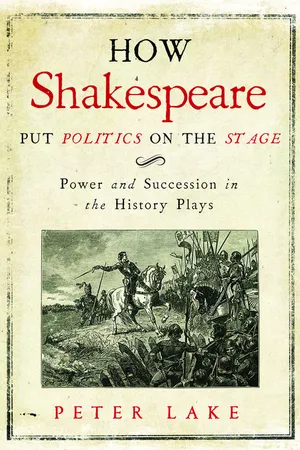
How Shakespeare Put Politics on the Stage
Power and Succession in the History Plays
- 696 pages
- English
- PDF
- Available on iOS & Android
About This Book
A masterful, highly engaging analysis of how Shakespeare's plays intersected with the politics and culture of Elizabethan England. With an ageing, childless monarch, lingering divisions due to the Reformation, and the threat of foreign enemies, Shakespeare's England was fraught with unparalleled anxiety and complicated problems. In this monumental work, Peter Lake reveals, more than any previous critic, the extent to which Shakespeare's plays speak to the depth and sophistication of Elizabethan political culture and the Elizabethan imagination. Lake reveals the complex ways in which Shakespeare's major plays engaged with the events of his day, particularly regarding the uncertain royal succession, theological and doctrinal debates, and virtue and virtù in politics. Through his plays, Lake demonstrates, Shakespeare was boldly in conversation with his audience about a range of contemporary issues. This remarkable literary and historical analysis pulls the curtain back on what Shakespeare was really telling his audience and what his plays tell us today about the times in which they were written.
Frequently asked questions
Information

Table of contents
- Contents
- Introduction and acknowledgements
- PART I: Contexts and structures
- PART II: Past into present and future: 2 and 3 Henry VI and the politics of lost legitimacy
- CHAPTER 1: Losing legitimacy: monarchical weakness and the descent into disorder
- CHAPTER 2: Disorder dissected (i): the inversion of the gender order
- CHAPTER 3: Disorder dissected (ii): the inversion of the social order
- CHAPTER 4: Hereditary ‘right’ and political legitimacy anatomised
- PART III: Happy endings and alternative outcomes: 1 Henry VI and Richard III
- CHAPTER 5: How not to go there: 1 Henry VI as prequel and alternative ending
- CHAPTER 6: Richard III: political ends, providential means
- CHAPTER 7: Going Roman: Richard III and Titus Andronicus compared
- PART IV: How (not) to depose a tyrant: King John and Richard II
- CHAPTER 8: The Elizabethan resonances of the reign of King John
- CHAPTER 9: The first time as polemic, the second time as play: Shakespeare’s King John and The troublesome reign
- CHAPTER 10: Richard II, or the rights and wrongs of resistance
- CHAPTER 11: Shakespeare and Parsons – again
- Part V: The Essexian circle squared, or a user’s guide to the politics of popularity, honour and legitimacy
- CHAPTER 12: The loss of legitimacy and the politics of commodity dissected
- CHAPTER 13: Learning to be a bastard: Hal’s second (plebeian) nature
- CHAPTER 14: Festive Falstaff: of popularity, puritans and princes
- CHAPTER 15: Henry V and the fruits of legitimacy
- PART VI :Using plays to read plays: the court politics of the dramatic riposte
- CHAPTER 16: Contemporary readings: Oldcastle/Falstaff, Cobham/Essex
- CHAPTER 17: Oldcastle redivivus
- PART VII: Julius Caesar: the dangers of playing pagan and republican politics in a Christian monarchy
- CHAPTER 18: The state we’re in
- CHAPTER 19: The politics of honour (in a popular state)
- CHAPTER 20: Performing honour and the politics of popularity (in a popular state)
- CHAPTER 21: The politics of popularity and faction (in a popular state)
- CHAPTER 22: The politics of prodigy, prophecy and providence (in a pagan state)
- CHAPTER 23: Between Henry V and Hamlet
- PART VIII: Disillusion: Christian and pagan style
- CHAPTER 24: Hamlet
- CHAPTER 25: The morning after the night before: Troilus and Cressida as retrospect
- Conclusion
- Notes
- Index